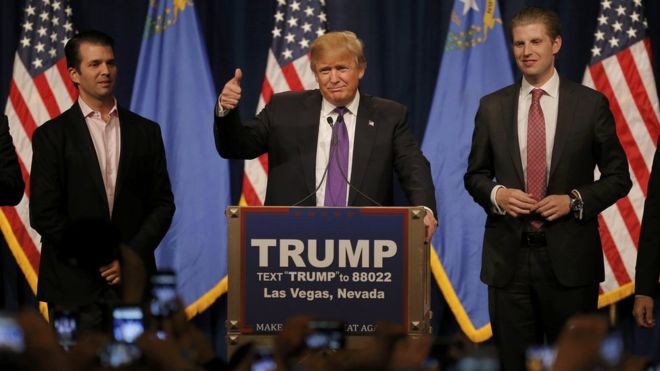[ad_1]

Republican presidential candidates Ted Cruz and Marco Rubio unleashed a barrage of attacks on front-runner Donald Trump in the last debate before a pivotal series of primaries.
The senators sought to blunt Mr Trump’s momentum after he won three of the first four contests.
Immigration, healthcare and outreach to Latino voters dominated the debate.
But like previous forums, the debate quickly dissolved into long periods of shouting and personal insults.
Mr Rubio, who has come second in many of the recent contests, rolled out a series of stinging attacks against Mr Trump.
“If he hadn’t inherited $200m, you know where Donald Trump would be? Selling watches in Manhattan,” Mr Rubio said in one tense exchange.
At long last the Republican candidates have come to the realisation that Donald Trump could actually win this thing, but it may be too late.
For more than two hours Senators Marco Rubio and Ted Cruz took turns throwing haymakers at the New Yorker. They attacked him on business record; they blasted him on past hypocrisies; they questioned his conservative credentials; and they criticised the lack of detail in his policies and his reliance on bluster.
“We’re having a lot of fun up here, aren’t we?” the front-runner quipped at one point. But the truth is that Mr Trump was on his heels for much of the evening.
The challenge for the men who would unseat the leader, however, is that the best time to bludgeon a candidate is before it’s clear circumstances are forcing you have to act. In a campaign where authenticity is worshipped above all, tonight’s fireworks could smack of the kind political expediency many associate with traditional politicians.
Both Mr Cruz and Mr Rubio drew blood with their attacks, but Mr Trump will likely emerge unbowed.
Mr Rubio also criticised Mr Trump’s failed online education venture, Trump University, and assailed Mr Trump for hiring foreign workers rather than Americans in his construction projects.
Mr Trump shot back: “I hired tens of thousands of people. You’ve hired nobody.”
The billionaire real estate mogul found himself increasingly on the defensive about his business dealings, his conservative credentials and his support for Israel.
In other debate highlights:
- Mr Cruz said Mr Trump’s reputation as a dealmaker means he cannot be trusted to appoint conservative justices to Supreme Court
- Most of the candidates were asked about releasing their tax returns; Mr Cruz and Mr Rubio pledged to release them in days while Mr Trump demurred
- Moderator and Telemundo presenter Maria Celeste grilled Mr Trump on how he would appeal to Latino voters in the general election
- Mr Trump addressed criticisms from Mexico’s former president who said the country would never pay for a border wall between the two counties. “Mexico will pay for the wall,” Mr Trump said. “The wall just got 10 feet taller”
- Ohio Governor John Kasich touted his successes in his state, including overcoming a budget deficit and bringing new industries to the state
- Former neurosurgeon Ben Carson, struggling to participate, at one point called out: “Can someone attack me?”
The stakes have been raised for the candidates. Next Tuesday, known as Super Tuesday, millions of voters in 11 states will cast ballots in the Republican race.
A quarter of the total numbers of delegates needed to the secure the nomination will be up for grabs that day.
Mr Rubio and Mr Cruz are under tremendous pressure unseat Mr Trump before his lead becomes insurmountable. He is current leading in 10 out of 11 states holding contests on Super Tuesday.
Mr Trump has been extremely popular despite his controversial comments about deporting millions of undocumented workers and banning Muslims from travelling to the United States.
After four primary and caucus competitions, Mr Trump has 82 Republican party delegates, Mr Cruz has 17 and Mr Rubio has 16. To become the Republican party’s nominee, a candidate has to have 1,237 total state delegates.
Each party formally announces their presidential candidate at conventions in July, four months before the presidential election.
–
Source: BBC
[ad_2]
